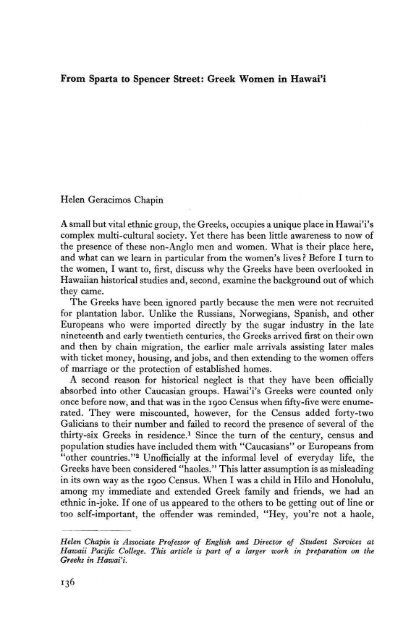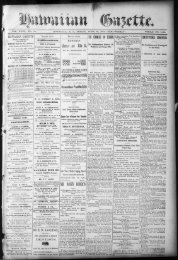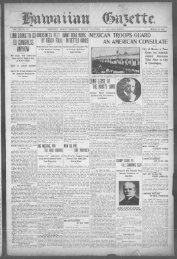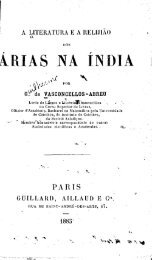From Sparta to Spencer Street: Greek Women in Hawai'i - eVols
From Sparta to Spencer Street: Greek Women in Hawai'i - eVols
From Sparta to Spencer Street: Greek Women in Hawai'i - eVols
Create successful ePaper yourself
Turn your PDF publications into a flip-book with our unique Google optimized e-Paper software.
<strong>From</strong> <strong>Sparta</strong> <strong>to</strong> <strong>Spencer</strong> <strong>Street</strong>: <strong>Greek</strong> <strong>Women</strong> <strong>in</strong> <strong>Hawai'i</strong><br />
Helen Geracimos Chap<strong>in</strong><br />
A small but vital ethnic group, the <strong>Greek</strong>s, occupies a unique place <strong>in</strong> <strong>Hawai'i</strong>'s<br />
complex multi-cultural society. Yet there has been little awareness <strong>to</strong> now of<br />
the presence of these non-Anglo men and women. What is their place here,<br />
and what can we learn <strong>in</strong> particular from the women's lives ? Before I turn <strong>to</strong><br />
the women, I want <strong>to</strong>, first, discuss why the <strong>Greek</strong>s have been overlooked <strong>in</strong><br />
Hawaiian his<strong>to</strong>rical studies and, second, exam<strong>in</strong>e the background out of which<br />
they came.<br />
The <strong>Greek</strong>s have been ignored partly because the men were not recruited<br />
for plantation labor. Unlike the Russians, Norwegians, Spanish, and other<br />
Europeans who were imported directly by the sugar <strong>in</strong>dustry <strong>in</strong> the late<br />
n<strong>in</strong>eteenth and early twentieth centuries, the <strong>Greek</strong>s arrived first on their own<br />
and then by cha<strong>in</strong> migration, the earlier male arrivals assist<strong>in</strong>g later males<br />
with ticket money, hous<strong>in</strong>g, and jobs, and then extend<strong>in</strong>g <strong>to</strong> the women offers<br />
of marriage or the protection of established homes.<br />
A second reason for his<strong>to</strong>rical neglect is that they have been officially<br />
absorbed <strong>in</strong><strong>to</strong> other Caucasian groups. <strong>Hawai'i</strong>'s <strong>Greek</strong>s were counted only<br />
once before now, and that was <strong>in</strong> the 1900 Census when fifty-five were enumerated.<br />
They were miscounted, however, for the Census added forty-two<br />
Galicians <strong>to</strong> their number and failed <strong>to</strong> record the presence of several of the<br />
thirty-six <strong>Greek</strong>s <strong>in</strong> residence. 1 S<strong>in</strong>ce the turn of the century, census and<br />
population studies have <strong>in</strong>cluded them with "Caucasians" or Europeans from<br />
"other countries." 2 Unofficially at the <strong>in</strong>formal level of everyday life, the<br />
<strong>Greek</strong>s have been considered "haoles." This latter assumption is as mislead<strong>in</strong>g<br />
<strong>in</strong> its own way as the 1900 Census. When I was a child <strong>in</strong> Hilo and Honolulu,<br />
among my immediate and extended <strong>Greek</strong> family and friends, we had an<br />
ethnic <strong>in</strong>-joke. If one of us appeared <strong>to</strong> the others <strong>to</strong> be gett<strong>in</strong>g out of l<strong>in</strong>e or<br />
<strong>to</strong>o self-important, the offender was rem<strong>in</strong>ded, "Hey, you're not a haole,<br />
Helen Chap<strong>in</strong> is Associate Professor of English and Direc<strong>to</strong>r of Student Services at<br />
Hawaii Pacific College. This article is part of a larger work <strong>in</strong> preparation on the<br />
<strong>Greek</strong>s <strong>in</strong> <strong>Hawai'i</strong>.<br />
136
you're a <strong>Greek</strong>." If a non-Caucasian taunted one of us with, "You damned<br />
haole,'' our sense of apartness showed <strong>in</strong> the reply, "I'm not haole, I'm <strong>Greek</strong>.''<br />
Low visibility is a third reason. A comparable study <strong>to</strong> m<strong>in</strong>e, that of a core<br />
group of 230 <strong>Greek</strong>s <strong>in</strong> Des Mo<strong>in</strong>es, Iowa, reveals that the <strong>Greek</strong>s have been<br />
one of the least conspicuous m<strong>in</strong>orities <strong>in</strong> that middle sized city. 3 They have<br />
no identifiable residential areas, little friction with the surround<strong>in</strong>g community,<br />
the need for few special services, and few bus<strong>in</strong>esses designated as ethnic. At<br />
the same time and <strong>to</strong> the surprise of the <strong>in</strong>vestiga<strong>to</strong>r, they th<strong>in</strong>k of themselves<br />
as dist<strong>in</strong>ct from the larger community. They support an Orthodox church, are<br />
active <strong>to</strong>gether <strong>in</strong> bus<strong>in</strong>ess, keep <strong>in</strong> <strong>to</strong>uch with friends and relatives <strong>in</strong> Greece,<br />
have returned <strong>to</strong> Greece <strong>to</strong> visit, and have been visited <strong>in</strong> turn by k<strong>in</strong> from<br />
there.<br />
In <strong>Hawai'i</strong> between 1879 and World War II, approximately eighty-five male<br />
pioneers, chiefly from the <strong>Sparta</strong> area <strong>in</strong> the Peloponnesus, settled on O'ahu<br />
and the island of <strong>Hawai'i</strong>. Between 1903 and 1939, twelve <strong>Greek</strong> born women<br />
came <strong>to</strong> live here. There has been a fresh <strong>in</strong>fusion of new first generation<br />
immigrants s<strong>in</strong>ce 1945, and a number of these have been women who have<br />
jo<strong>in</strong>ed the primary group. In addition, several hundred second and third<br />
generation <strong>Greek</strong> Americans have settled <strong>in</strong> <strong>Hawai'i</strong> between 1900 and the<br />
present. But I am limit<strong>in</strong>g my discussion here <strong>to</strong> the twelve first generation<br />
pre-World War II women for the follow<strong>in</strong>g reasons. First, this group, which<br />
conta<strong>in</strong>^ young girls <strong>to</strong> old women, is an his<strong>to</strong>rical reflection of female<br />
immigrant experiences. The group represents a spectrum that ranges from<br />
almost <strong>to</strong>tal lack of assimilation, <strong>to</strong> a partial accomodation <strong>to</strong> <strong>Hawai'i</strong>'s<br />
emerg<strong>in</strong>g culture, <strong>to</strong> an acceptance of the new society while yet ma<strong>in</strong>ta<strong>in</strong><strong>in</strong>g<br />
socio-cultural dist<strong>in</strong>ctiveness. Second, the <strong>Greek</strong> women are examples of the<br />
force of <strong>in</strong>dividual human lives caught up <strong>in</strong> but not dom<strong>in</strong>ated by larger<br />
events. While they <strong>in</strong>itially followed the men 10,000 miles, they have not been<br />
just passive agents upon whom a new and alien culture imposed itself, but<br />
have <strong>in</strong> vary<strong>in</strong>g degrees transported values and cus<strong>to</strong>ms and kept them alive.<br />
Third, <strong>in</strong> them we can see what it means <strong>to</strong> be <strong>Greek</strong> and female <strong>in</strong> <strong>Hawai'i</strong>.<br />
The <strong>Greek</strong> background out of which they came <strong>in</strong>volves his<strong>to</strong>ry and<br />
politics, nationality and ethnicity, economics and family structure, language<br />
and religion. To be born <strong>Greek</strong> is <strong>to</strong> feel different. <strong>Greek</strong>s are connected <strong>to</strong> a<br />
3000 year old his<strong>to</strong>rical greatness. They are simultaneously aware of a his<strong>to</strong>ry<br />
of terrible suffer<strong>in</strong>g. For 2000 years the country has been the land of <strong>in</strong>vasions,<br />
its people cruelly overrun and oppressed by the Romans, Franks, Venetians,<br />
the Turks, Bulgarians, Albanians, Italians, and Germans. A fierce struggle for<br />
survival has undoubtedly <strong>in</strong>tensified ethnikos, or <strong>Greek</strong> ethnicity. Regional and<br />
class differences do, of course, exist among them, but Greece's def<strong>in</strong>ition of a<br />
<strong>Greek</strong> is <strong>in</strong>clusive. If one parent is a <strong>Greek</strong>, the child is so. Nor can nationality<br />
be transferred or eradicated. For example, although Byzant<strong>in</strong>e Greece was<br />
conquered by the Turks <strong>in</strong> the fifteenth century, one can be born and raised<br />
<strong>in</strong> Constant<strong>in</strong>ople, or present day Istanbul, and can be descended from<br />
generations of Turkish born <strong>Greek</strong>s, and yet never be considered Turkish.<br />
Ethnikos is also a universal human quality which, paradoxically, strengthens<br />
137
its force. As Harold Isaacs has said <strong>in</strong> his brilliant Idols of the Tribe, one's<br />
basic identity is <strong>in</strong>timately connected <strong>to</strong> the body and, by extension, <strong>to</strong> one's<br />
family, k<strong>in</strong>, or group. The essential order of human existence is a primordial<br />
and persistent tribalism. One's identity is further <strong>in</strong>tegrated with the place<br />
where one lives, with one's name, language, his<strong>to</strong>ry and orig<strong>in</strong>s, religion, and<br />
nation. 4<br />
The political, economic, and family structures of Greece are <strong>in</strong>tricately<br />
woven <strong>in</strong><strong>to</strong> its his<strong>to</strong>ry, <strong>to</strong>o. It the late n<strong>in</strong>eteenth and early twentieth centuries,<br />
a country wide agricultural depression reached catastrophic proportions <strong>in</strong> a<br />
predom<strong>in</strong>antly peasant culture. At the same time, a develop<strong>in</strong>g railroad and<br />
steamship technology made mass migration possible <strong>to</strong> an <strong>in</strong>dustrializ<strong>in</strong>g<br />
America. The <strong>Greek</strong>-American scholar Theodore Salou<strong>to</strong>s has calculated that<br />
from <strong>Sparta</strong> alone between 1890 and 1910 an estimated three-fourths of the<br />
eighteen <strong>to</strong> thirty-five year old male population departed. 5 <strong>Hawai'i</strong>, with its<br />
own grow<strong>in</strong>g trade and commerce and need for workers, was an effective if<br />
lesser "distant magnet." 6<br />
What does it mean <strong>to</strong> be <strong>Greek</strong> and female? Left beh<strong>in</strong>d by an exodus of<br />
men that devasted whole villages were the women. William Miller, <strong>in</strong> <strong>Greek</strong><br />
Life <strong>in</strong> Town and Country, has described poor women <strong>to</strong>il<strong>in</strong>g early and late <strong>in</strong><br />
the fields and olive groves and clear<strong>in</strong>g s<strong>to</strong>nes off the roads. 7 Economically<br />
better off females shared a bleak fate, <strong>to</strong>o. All were trapped <strong>in</strong> a patriarchal<br />
society with a rigid land and dowry system. By 1900 a large surplus of women,<br />
big families, dim<strong>in</strong>ish<strong>in</strong>g conserves of land, and severe rural poverty made the<br />
system especially cruel and archaic. His<strong>to</strong>rically, the concept of land ownership<br />
is deep <strong>in</strong> <strong>Greek</strong> cus<strong>to</strong>m and law. The basic family has been a k<strong>in</strong> group that<br />
conserves, accumulates, and transmits property, pr<strong>in</strong>cipally land, from one<br />
generation <strong>to</strong> the next <strong>in</strong> equal shares among the children. Tied <strong>to</strong> the land<br />
concept has been a dowry system only now undergo<strong>in</strong>g change. 8 <strong>From</strong> his<br />
daughters' young years, a father had <strong>to</strong> calculate what he could give for dowries<br />
<strong>in</strong> the way of land, money, or both, and what would be left for his sons <strong>to</strong><br />
share. If the father's hold<strong>in</strong>gs could not support the sons, as many as possible,<br />
beg<strong>in</strong>n<strong>in</strong>g with the oldest, were educated. They were then considered <strong>to</strong> have<br />
received their patrimony and <strong>to</strong> have added <strong>to</strong> the family's status. A daughter,<br />
however, was always a net economic loss. She might attend grammar or even<br />
high school but then stayed home and prepared her prika, or dowry, worked<br />
at household tasks, and helped with the younger children. 9 Work<strong>in</strong>g outside<br />
the home was considered demean<strong>in</strong>g, and marriage and the family a woman's<br />
only natural profession. The correct social situation was for the oldest girl <strong>to</strong><br />
marry first, followed <strong>in</strong> descend<strong>in</strong>g order by her younger sisters. Nor could<br />
a daughter benefit from her brothers marry<strong>in</strong>g well-dowered women because<br />
that property went <strong>to</strong> the new family. If her father could not supply her<br />
dowry, her brothers <strong>in</strong>herited the obligation. Many men emigrated <strong>in</strong> order<br />
<strong>to</strong> earn money <strong>to</strong> send <strong>to</strong> their sisters, and some of these men became old<br />
bachelors do<strong>in</strong>g so. Without a dowry it simply did not matter how beautiful<br />
or pure the girl was (and purity was of great concern), she could not marry.<br />
138
Marriage was a barga<strong>in</strong> with terms, and divorce <strong>in</strong>frequent and only justified<br />
by church laws on the grounds of <strong>in</strong>fidelity.<br />
An alternative for a woman after mass male emigration began was <strong>to</strong> have<br />
a marriage arranged for her by relatives or friends <strong>to</strong> a <strong>Greek</strong> man <strong>in</strong> or from<br />
America. The man would have been released economically and psychologically<br />
from the constra<strong>in</strong>ts of the system and yet would still want a <strong>Greek</strong> wife. This<br />
practice often meant the wife was many years younger than her husband.<br />
Another alternative was provided by emigrat<strong>in</strong>g men tak<strong>in</strong>g their women<br />
k<strong>in</strong>folk away from Greece or send<strong>in</strong>g for them, for daughters and s<strong>in</strong>gle women<br />
could get married abroad.<br />
Religion and language have also played an <strong>in</strong>tegral role <strong>in</strong> <strong>Greek</strong> women's<br />
values and behavior. <strong>Greek</strong>s have absorbed <strong>in</strong><strong>to</strong> Christianity an ancient<br />
polytheism. In the countryside there still exists a vigorous folk religion<br />
epi<strong>to</strong>mized by belief <strong>in</strong> natural spirits and the danger of the evil eye. Established<br />
dur<strong>in</strong>g the division of the Roman Empire, the eastern half, of Christianity<br />
became centered <strong>in</strong> Constant<strong>in</strong>ople, developed <strong>in</strong><strong>to</strong> Orthodoxy, and rema<strong>in</strong>ed<br />
<strong>Greek</strong> among the alien and frequently hostile Turks. 10 There as well as on the<br />
<strong>Greek</strong> ma<strong>in</strong>land and islands, Orthodoxy has been a powerful unify<strong>in</strong>g political<br />
force aga<strong>in</strong>st <strong>in</strong>vaders.<br />
With a doctr<strong>in</strong>e formulated <strong>in</strong> the fourth century, with its ancient recurr<strong>in</strong>g<br />
rituals of the great events of life and death—birth, baptism, name days,<br />
wedd<strong>in</strong>gs, funerals—with a liturgy accompanied by chant<strong>in</strong>g and by the fumes<br />
from warm <strong>in</strong>cense fil<strong>in</strong>g the church, Orthodoxy is a religion of great power.<br />
Transferred <strong>to</strong> America <strong>in</strong> the n<strong>in</strong>eteenth century, the Church has been a<br />
central method by which immigrants have kept <strong>to</strong> the old ways. In the absence<br />
of a formal church structure <strong>in</strong> <strong>Hawai'i</strong> between the first settlement and 1965,<br />
the <strong>Greek</strong>s observed their religion <strong>in</strong> a variety of ways: through visit<strong>in</strong>g clergy,<br />
by attend<strong>in</strong>g the Episcopal church which did not proselytize them, or<br />
<strong>in</strong>formally among themselves. Somehow all but two of the twenty-four second<br />
generation children were baptized <strong>Greek</strong> Orthodox. The most devout women<br />
have kept <strong>in</strong> their homes little altars consist<strong>in</strong>g of eikons, or small pa<strong>in</strong>ted<br />
pictures, with lamps or candles before them. Follow<strong>in</strong>g ancient cus<strong>to</strong>m, they<br />
have prayed morn<strong>in</strong>g and even<strong>in</strong>g <strong>in</strong> solitude.<br />
The <strong>Greek</strong> church abroad has been his<strong>to</strong>rically responsible for operat<strong>in</strong>g<br />
<strong>Greek</strong> schools and teach<strong>in</strong>g the language. In the absence of one <strong>in</strong> <strong>Hawai'i</strong><br />
until the establishment of Sa<strong>in</strong>ts Helen and Constant<strong>in</strong>e Church <strong>in</strong> Nuuanu<br />
Valley <strong>in</strong> 1965, language transmittal was a burden placed on the women at<br />
home with young children. The twelve first generation women represent not<br />
just vary<strong>in</strong>g degrees of religious belief but also a cont<strong>in</strong>uum of l<strong>in</strong>guistic<br />
orientation from monol<strong>in</strong>gual <strong>Greek</strong> usage <strong>to</strong> bil<strong>in</strong>gualism. 11<br />
The first <strong>Greek</strong> woman <strong>to</strong> reach <strong>Hawai'i</strong> was Athena Geracimos Lycurgus<br />
<strong>in</strong> 1903. 12 She was born <strong>in</strong> <strong>Sparta</strong>, the oldest daughter and second child of<br />
a family of n<strong>in</strong>e children. Her father Nicholas Geracimos was a lawyer who<br />
had status but little money. On her mother's side she was descended from a<br />
national hero of the <strong>Greek</strong> War of Independence (1825-32) aga<strong>in</strong>st the Turks.<br />
139
Her relatives were prom<strong>in</strong>ent <strong>in</strong> government circles, and Athena was said <strong>to</strong><br />
come from "a good family." The oldest sons were tra<strong>in</strong>ed for the law. She<br />
and her sisters attended high school, but then she stayed home and helped<br />
her mother with the younger children and the housework.<br />
<strong>Sparta</strong> <strong>in</strong> 1903 was little more than a large village built around a square,<br />
with two or three long streets and unpaved cross lanes. But its sett<strong>in</strong>g <strong>in</strong> a<br />
beautiful valley of lemon groves and rhododendrons is memorable. Through<br />
the valley runs the Eurotas River, with willows droop<strong>in</strong>g <strong>to</strong> the water. Along<br />
the banks Helen of Troy is said <strong>to</strong> have strolled. The Geracimos family,<br />
follow<strong>in</strong>g cus<strong>to</strong>m for all but the very poor, spent the warm season of each year<br />
<strong>in</strong> a "summer village," Tz<strong>in</strong>z<strong>in</strong>a, nestled <strong>in</strong> the nearby hills.<br />
George Lycurgus had left a futureless Vasara, near <strong>Sparta</strong>, <strong>in</strong> 1877. He<br />
arrived by steerage <strong>in</strong> New York with $15.00 <strong>in</strong> his pockets and worked his<br />
way across country. A restless adventurer and a clever entrepreneur, he<br />
eventually reached <strong>Hawai'i</strong> <strong>in</strong> 1889 where he jo<strong>in</strong>ed other enterpris<strong>in</strong>g <strong>Greek</strong><br />
men and built up several bus<strong>in</strong>esses. 13 One was the Sans Souci Hotel which he<br />
operated <strong>in</strong> the 1890's, and another the Union Grill <strong>in</strong> down<strong>to</strong>wn Honolulu<br />
after 1901. He sent for friends and relatives from Greece <strong>to</strong> work for and with<br />
him. He moved <strong>in</strong><strong>to</strong> a central position <strong>in</strong> the grow<strong>in</strong>g <strong>Greek</strong> community<br />
because of his own develop<strong>in</strong>g economic stability and because he established<br />
a family and was directly or <strong>in</strong>directly <strong>in</strong>volved <strong>in</strong> br<strong>in</strong>g<strong>in</strong>g eleven of the twelve<br />
<strong>Greek</strong> women <strong>to</strong> <strong>Hawai'i</strong>. He became <strong>to</strong> all barba yorghi, or "Uncle George"<br />
as <strong>in</strong> later years he was known throughout the Islands. But before this happened,<br />
<strong>in</strong> 1903 he returned <strong>to</strong> Greece. His double purpose was <strong>to</strong> see the<br />
mother he had left twenty-six years earlier and <strong>to</strong> obta<strong>in</strong> a wife. In <strong>Sparta</strong> the<br />
forty-six year old man met and married the beautiful n<strong>in</strong>eteen year old Athena<br />
Geracimos of impeccable respectability.<br />
Athena's arrival <strong>in</strong> America first class was memorable <strong>to</strong> both of them and<br />
a shock <strong>to</strong> her, for they handed down the event <strong>to</strong> their children as a family<br />
anecdote. George Lycurgus left his young wife on the New York City dock<br />
while he searched for a porter. The Salvation Army came and tried <strong>to</strong> talk<br />
with her, but she spoke no English. When he returned and said, "Let's go,"<br />
they thought he was try<strong>in</strong>g <strong>to</strong> force her <strong>to</strong> accompany him. The Salvation<br />
Army was concerned about the unscrupulous practice at that time of the<br />
importation of women from Europe as prostitutes. Police and <strong>in</strong>terpreters<br />
were called. George Lycurgus f<strong>in</strong>ally produced a marriage license, and Athena<br />
assured everyone she was married <strong>to</strong> him. She was always fond of the Salvation<br />
Army after that and made it one of her charities <strong>in</strong> Hilo. 14<br />
Top: 1934—Hawaii National Park<br />
Bird Park picnic, clockwise around the picnic table: Constance Geracimos,<br />
Pota Geracimos, Poppy De<strong>to</strong>r, Nicky De<strong>to</strong>r, Athena Lycurgus.<br />
In order of arrival <strong>in</strong> <strong>Hawai'i</strong>: Athena Lycurgus (1903), Poppy De<strong>to</strong>r (1920),<br />
Pota Geracimos (1921).<br />
Bot<strong>to</strong>m: On the old Lurl<strong>in</strong>e, 1938: George Lycurgus and his daughter, Georg<strong>in</strong>a<br />
Maggioros; and first generation Kay and Joan Maggioros.<br />
140<br />
Pho<strong>to</strong>graphs from the author's collection
In <strong>Hawai'i</strong> Athena Lycurgus's life reflects a surface accommodation <strong>to</strong> a<br />
new language and cus<strong>to</strong>ms but a deeper lack of assimilation. In 1903 the ratio<br />
of <strong>Greek</strong> men <strong>to</strong> women, <strong>in</strong> <strong>Hawai'i</strong> as on the ma<strong>in</strong>land, was thirty <strong>to</strong> one. The<br />
difference here was that she was the only one. Settl<strong>in</strong>g <strong>in</strong> Honolulu <strong>in</strong> a house<br />
on Beretania <strong>Street</strong> (on the site of the present Board of Water Supply), she<br />
was befriended and taught English by three sisters who were neighbors, a<br />
friendship several <strong>in</strong>formants have said was a "lifesaver" for Athena. Her early<br />
letters back <strong>to</strong> Greece express a cheerful <strong>in</strong>terest <strong>in</strong> bazaars she attended,<br />
pretty dresses made for her by seamstresses, and danc<strong>in</strong>g at the Hawaiian<br />
Hotel. She, George, and their household help lived comfortably across the<br />
street from the large room<strong>in</strong>g house where the "<strong>Greek</strong> boys" who worked for<br />
Lycurgus lived. They treated her k<strong>in</strong>dly—she wrote that they gave her<br />
beautiful and thoughtful gifts of silver, ch<strong>in</strong>a, bowls of fruit, and stationery.<br />
The couple welcomed a daughter whom they named Georg<strong>in</strong>a, the first<br />
all-<strong>Greek</strong> child born <strong>in</strong> <strong>Hawai'i</strong>. George <strong>in</strong> 1904 leased the Volcano House<br />
and soon after acquired the Hilo Hotel. Athena divided her time between<br />
Honolulu and the Volcano House and with<strong>in</strong> a short time had a clear grasp of<br />
her husband's enterprises and sugar s<strong>to</strong>cks. After a year's trip back <strong>to</strong> Greece,<br />
dur<strong>in</strong>g which their second child and first son Leo was born, she succeeded <strong>in</strong><br />
br<strong>in</strong>g<strong>in</strong>g <strong>to</strong> <strong>Hawai'i</strong> her younger brothers George and Mitchell. Her letters<br />
recount pleasant summer family gather<strong>in</strong>gs at the Volcano with music and<br />
danc<strong>in</strong>g, and out<strong>in</strong>gs like hik<strong>in</strong>g and horseback rid<strong>in</strong>g. She was pleased that<br />
their daughter dur<strong>in</strong>g the school year attended "the best school <strong>in</strong> Honolulu,<br />
Punahou." 15<br />
Her letters also attest <strong>to</strong> her thoughts dwell<strong>in</strong>g <strong>in</strong> Greece. She wrote: "I am<br />
melancholic and nostalgic, abstracted and absent-m<strong>in</strong>ded. My m<strong>in</strong>d is always<br />
there with you." Her father fell ill <strong>in</strong> 1910, and she wanted <strong>to</strong> br<strong>in</strong>g her next<br />
younger sister Poppy <strong>to</strong> <strong>Hawai'i</strong> but could not work out the details:<br />
You are wish<strong>in</strong>g <strong>to</strong> be here and I am wish<strong>in</strong>g <strong>to</strong> be there. My Poppy, that was my<br />
best life;—as a young girl <strong>in</strong> Tz<strong>in</strong>z<strong>in</strong>a. Now I have all the best, but I am remember<strong>in</strong>g<br />
that life. . . . The time will pass . . . and we will be all <strong>to</strong>gether. Tell father when I am<br />
go<strong>in</strong>g <strong>to</strong> be there with God's help.<br />
Little Georg<strong>in</strong>a received five dolls for Christmas, and Athena put away four<br />
of them <strong>to</strong> take <strong>to</strong> her own young sisters <strong>in</strong> <strong>Sparta</strong>.<br />
When the Lycurgus family travelled back <strong>to</strong> Greece the second time for<br />
the birth of their third child Nicholas, events <strong>in</strong>tervened <strong>to</strong> keep them there:<br />
the <strong>Greek</strong>-Bulgarian Wars of 1912-13, her father's death, and World War I.<br />
George Lycurgus had <strong>in</strong> the meantime purchased a large house <strong>in</strong> Athens <strong>in</strong><br />
Top left: Left <strong>to</strong> right, on <strong>Spencer</strong> <strong>Street</strong>: Coralia Souslides and her mother,<br />
Desp<strong>in</strong>a Psalti.<br />
Top right: 1945—Makiki Heights<br />
Urania Michopulos.<br />
Bot<strong>to</strong>m: 1934—Beach Picnic<br />
Coralia Souslides, Valent<strong>in</strong>e Anastasopulos, Desp<strong>in</strong>a Psalti, Julia Sideris,<br />
Julia Anastasopulos, Aphrodite Chrones.<br />
Pho<strong>to</strong>graphs from the author's collection<br />
141
which they lived. When it was possible <strong>to</strong> travel, he returned <strong>to</strong> <strong>Hawai'i</strong> <strong>in</strong><br />
1920 with Georg<strong>in</strong>a and with the newly married John and Poppy De<strong>to</strong>r.<br />
Feel<strong>in</strong>g unwell, Athena rema<strong>in</strong>ed <strong>in</strong> Greece with their sons until 1922. Back<br />
<strong>in</strong> Hilo, where the Lycurguses now settled at the Hilo Hotel, there seems <strong>to</strong><br />
have been a good adjustment. She became fluent <strong>in</strong> English, although she<br />
reta<strong>in</strong>ed a slight accent, and her name appeared <strong>in</strong> the social columns of the<br />
Hilo Tribune Herald. She jo<strong>in</strong>ed the Hilo <strong>Women</strong>'s Club and became active <strong>in</strong><br />
the family hotels, supervis<strong>in</strong>g the employees, oversee<strong>in</strong>g the laundry and<br />
gardens, and perform<strong>in</strong>g a daily favorite occupation of arrang<strong>in</strong>g fresh flowers<br />
for the d<strong>in</strong><strong>in</strong>g room tables. Through her efforts the Hilo Hotel especially<br />
ga<strong>in</strong>ed a reputation for hospitality and charm. Her work was considered by<br />
her family as "giv<strong>in</strong>g her someth<strong>in</strong>g <strong>to</strong> do." When she drew money for it she<br />
primarily sent it <strong>to</strong> sisters, brothers, and other family members <strong>in</strong> Greece.<br />
A picture emerges of a busy, productive, pleasant woman with conflict<strong>in</strong>g<br />
commitments. As one <strong>in</strong>formant has said, "She was always th<strong>in</strong>k<strong>in</strong>g of Greece<br />
and wish<strong>in</strong>g <strong>to</strong> return. She made friends here, but actually he [George] made<br />
most of them."<br />
She made three more journeys back <strong>to</strong> Greece. The first <strong>in</strong> 1927 was for<br />
her daughter Georg<strong>in</strong>a's marriage <strong>to</strong> an Athenian, and the second <strong>in</strong> 1932<br />
was <strong>to</strong> see her daughter and <strong>to</strong> attempt <strong>to</strong> arrange a sister's marriage. Money,<br />
however, was <strong>in</strong> short supply dur<strong>in</strong>g the Depression, and this caused her acute<br />
concern which was only alleviated by her enjoyment <strong>in</strong> Georg<strong>in</strong>a's grow<strong>in</strong>g<br />
family. She did discover that she missed the weekend cottage she and George<br />
had built at Kaumana: "Wherever someone has his house he feels for the place<br />
and wants <strong>to</strong> return." 16 Her dear sister Poppy moved <strong>to</strong> Hilo <strong>in</strong> 1933 and<br />
provided constant company. The sisters spoke only <strong>Greek</strong> <strong>to</strong> each other.<br />
Athena was plann<strong>in</strong>g still another trip <strong>to</strong> see her daughter and granddaughters<br />
when she learned she had cancer. In 1937 she died <strong>in</strong> Hilo. Aga<strong>in</strong>st <strong>Greek</strong><br />
Church law but because it was her wish, she was cremated. This permitted<br />
her daughter Georg<strong>in</strong>a <strong>to</strong> take Athena's ashes back <strong>to</strong> Greece on a f<strong>in</strong>al<br />
journey. George Lycurgus, by contrast, who died <strong>in</strong> i960, is buried on the<br />
Big Island which he grew <strong>to</strong> love before all other places.<br />
Athena's sister Poppy Geracimos De<strong>to</strong>r <strong>in</strong> 1920 was the second <strong>Greek</strong> woman<br />
<strong>to</strong> settle <strong>in</strong> <strong>Hawai'i</strong>. Older than her sister when she emigrated, she always<br />
spoke English with a pronounced accent. She, <strong>to</strong>o, felt the trauma of separation,<br />
but her double cultural loyalties were less conflicted, and she seems <strong>to</strong> have<br />
eventually worked them out.<br />
Between 1880 and 1930 there were several ways for <strong>Greek</strong> men <strong>in</strong> <strong>Hawai'i</strong><br />
<strong>to</strong> adjust <strong>to</strong> be<strong>in</strong>g without <strong>Greek</strong> women. Several married Portuguese or<br />
Hawaiian women or those of other races. These mixed families had their own<br />
adjustment patterns but are outside the scope of this study. Some <strong>Greek</strong> men<br />
stayed s<strong>in</strong>gle all their lives. Others returned <strong>to</strong> Greece, after liv<strong>in</strong>g <strong>in</strong> <strong>Hawai'i</strong><br />
for twenty or thirty years, married, and rema<strong>in</strong>ed there. John De<strong>to</strong>r came <strong>to</strong><br />
<strong>Hawai'i</strong> <strong>in</strong> 1897 <strong>to</strong> work for George Lycurgus and returned <strong>to</strong> Vasara for a<br />
short visit <strong>in</strong> 1910 <strong>to</strong> see his mother and <strong>to</strong> br<strong>in</strong>g back a young nephew, George<br />
Michopulos. When John acquired economic security his determ<strong>in</strong>ation grew<br />
142
<strong>to</strong> have a <strong>Greek</strong> wife and live <strong>in</strong> <strong>Hawai'i</strong>. He embarked once aga<strong>in</strong> for Greece,<br />
travel<strong>in</strong>g <strong>in</strong> 1919 with Demosthenes Lycurgus, a nephew of George Lycurgus<br />
who had arrived <strong>in</strong> <strong>Hawai'i</strong> <strong>in</strong> 1892. John wrote of himself and Demosthenes,<br />
"We were prospective grooms look<strong>in</strong>g for girls." 17 He matter-of-factly added<br />
that many girls and families were "applicants" and that a "barga<strong>in</strong> was struck"<br />
between Demosthenes and the Yatrakos family for the hand of their daughter<br />
Maria. The forty year old John rediscovered a grown up Poppy Geracimos.<br />
At the Lycurgus home <strong>in</strong> Athens a double engagement party was celebrated<br />
which seemed <strong>to</strong> portend that two new <strong>Greek</strong> wives would leave for <strong>Hawai'i</strong>.<br />
Demosthenes Lycurgus, however, had contracted the flu. He refused <strong>to</strong><br />
postpone the wedd<strong>in</strong>g festivities, and John and Demosthenes were married<br />
with<strong>in</strong> two days of each other. A week after his wedd<strong>in</strong>g Demosthenes was<br />
dead. His widow stayed <strong>in</strong> Greece.<br />
Poppy De<strong>to</strong>r left Greece <strong>in</strong> June, 1920, with her husband John, brother-<strong>in</strong>law<br />
George Lycurgus, and her niece Georg<strong>in</strong>a. John De<strong>to</strong>r's notebook reveals<br />
that Poppy was ill and nervous but that matters improved when she had a<br />
reunion with her own brother George Geracimos <strong>in</strong> San Francisco. George<br />
had gone <strong>to</strong> <strong>Hawai'i</strong> <strong>in</strong> 1908, at the <strong>in</strong>stigation of his sister Athena, <strong>to</strong> work for<br />
George Lycurgus. He returned <strong>to</strong> Greece <strong>to</strong> fight <strong>in</strong> the <strong>Greek</strong>-Bulgarian<br />
wars, came back <strong>to</strong> the United States and served <strong>in</strong> the American Army, then<br />
worked briefly <strong>in</strong> San Francisco and found there for himself a <strong>Greek</strong> wife.<br />
In Honolulu <strong>in</strong> 1921 the De<strong>to</strong>rs were jo<strong>in</strong>ed by George Geracimos and his<br />
bride Pota and shared a big house on old Kapiolani <strong>Street</strong> where they raised<br />
their first children <strong>to</strong>gether and celebrated Easter by bak<strong>in</strong>g Easter bread and<br />
crack<strong>in</strong>g red dyed eggs for luck.<br />
Cultural change for immigrants is hastened by their American born children.<br />
The Lycurgus sons, technically American citizens, were European born, and<br />
the daughter <strong>in</strong> adulthood returned <strong>to</strong> Greece <strong>to</strong> marry and live. Poppy went<br />
back <strong>in</strong> 1929 for a one year visit with her family, <strong>to</strong> try <strong>to</strong> f<strong>in</strong>d a wife for her<br />
youngest brother Mitchell, and so her sons could attend <strong>Greek</strong> schools. Her<br />
letters show that she <strong>in</strong>tensely disliked the separation from her husband who<br />
was thoroughly committed <strong>to</strong> <strong>Hawai'i</strong>. In 1933 the De<strong>to</strong>rs moved permanently<br />
<strong>to</strong> Hilo, and the second generation De<strong>to</strong>r children grew up <strong>to</strong> consider themselves<br />
"Hilo boys." They both served <strong>in</strong> the U.S. Army Air Corps dur<strong>in</strong>g<br />
World War II and married non-<strong>Greek</strong> girls, both assimilative <strong>in</strong>fluences on<br />
immigrant parents. One Lycurgus son married a non-<strong>Greek</strong>, but after his<br />
mother's death. Although they would like <strong>to</strong>, the Deter brothers <strong>in</strong> adulthood<br />
have not visited Greece, while the Lycurgus brothers have made a po<strong>in</strong>t of<br />
mak<strong>in</strong>g several trips.<br />
Poppy's life conta<strong>in</strong>ed several other important cultural patterns. One was<br />
the adaptation of <strong>Greek</strong> folk beliefs <strong>to</strong> Hawaiian mythology and folklore. She<br />
feared the <strong>Greek</strong> evil eye, for example, and blended that <strong>in</strong><strong>to</strong> a belief <strong>in</strong><br />
kahunas. She was conv<strong>in</strong>ced she saw and spoke with Pele as a beautiful woman<br />
with flow<strong>in</strong>g hair, walk<strong>in</strong>g along the Hilo-Volcano road. Another pattern is<br />
that after her sister died, Poppy, now the only <strong>Greek</strong> woman <strong>in</strong> Hilo except<br />
for visits from Honolulu residents, extended herself <strong>in</strong><strong>to</strong> the community.
Besides tak<strong>in</strong>g over the supervision of hotel employees, she made friends<br />
among the Scottish and Portuguese wives of the men employed by plantations<br />
or <strong>in</strong> bus<strong>in</strong>ess <strong>in</strong> Hilo. John De<strong>to</strong>r was an enthusiastic jo<strong>in</strong>er and enjoyed<br />
membership <strong>in</strong> several social organizations like the Shr<strong>in</strong>ers and Elks. Poppy<br />
did volunteer work <strong>in</strong> <strong>to</strong>wn for the Red Cross and was active <strong>in</strong> the woman's<br />
auxiliary of her husband's Masonic order, which further brought her <strong>in</strong><strong>to</strong><br />
Hilo social life.<br />
The second World War caused a severance of communications between<br />
<strong>Hawai'i</strong>'s <strong>Greek</strong>s and theii European families. Poppy was deeply anxious,<br />
and at the war's end sent cloth<strong>in</strong>g and food <strong>in</strong> large quantities <strong>to</strong> help her<br />
family get through the <strong>Greek</strong> Civil War. When John De<strong>to</strong>r died <strong>in</strong> 1958 she<br />
returned <strong>to</strong> Greece <strong>to</strong> live for five years with her beloved sisters. But her sons<br />
<strong>in</strong> <strong>Hawai'i</strong> and her third generation grandchildren were a strong lure <strong>in</strong> then<br />
draw<strong>in</strong>g her back for good <strong>to</strong> the Islands. On the last day of her life <strong>in</strong> 1968,<br />
accord<strong>in</strong>g <strong>to</strong> a daughter-<strong>in</strong>-law, Poppy peacefully crooned a <strong>Greek</strong> lullaby <strong>to</strong><br />
herself. She is buried beside her husband <strong>in</strong> Hilo.<br />
The sister-<strong>in</strong>-law whom Poppy De<strong>to</strong>r met <strong>in</strong> San Francisco was Pota<br />
Demetrak Geracimos. Born <strong>in</strong> a village near <strong>Sparta</strong>, she was the poorest of all<br />
the twelve women and the only one not of a higher socio-economic class than<br />
her husband. Her memories of Greece are the least affectionate:<br />
I remember my village. There were no cemetaries. People were buried <strong>in</strong> the backyards,<br />
and my sister who died was buried <strong>in</strong> our backyard. Home was one large room<br />
made of s<strong>to</strong>ne. We slept there and cooked <strong>in</strong> the fireplace. My father's older brother<br />
went <strong>to</strong> America first, and then my father followed. My mother picked olives—that was<br />
how she ma<strong>in</strong>ta<strong>in</strong>ed the family after my father left. I remember ly<strong>in</strong>g on the ground at<br />
the bot<strong>to</strong>m of a tree and watch<strong>in</strong>g my sweet mother pick olives for pay. We ate dry<br />
bread and olives—that was the ma<strong>in</strong>stay of our diet. 18<br />
One recalls Miller's description of poor peasant women at the turn of the<br />
century. The family suffered. Pota's older sister was raped, became pregnant,<br />
and was hidden by their mother until the baby could be secretly got rid of;<br />
otherwise, the girl would have been s<strong>to</strong>ned by the villagers. To this day if a<br />
girl or woman is raped she is somehow considered <strong>to</strong> be at fault. The oldest<br />
brother was bitter at be<strong>in</strong>g denied his youth and an education. Seven years<br />
after the father's departure for the land where there was supposed <strong>to</strong> be gold<br />
<strong>in</strong> the streets, the father sent the ticket money. "We were lucky," Pota said.<br />
"Some men never sent for their families." Pota's mother, brother, and sisters<br />
made their exodus <strong>in</strong> 1907, the peak year for <strong>Greek</strong> emigration <strong>in</strong><strong>to</strong> the United<br />
States. They walked and got rides <strong>in</strong> carts from their village <strong>to</strong> the port of<br />
Patras, sleep<strong>in</strong>g along the way <strong>in</strong> the open air. Pota recalls the bundles they<br />
carried, lived out of, and slept on. Because regula<strong>to</strong>ry measures were beg<strong>in</strong>n<strong>in</strong>g<br />
<strong>to</strong> be enforced, they were <strong>in</strong>spected first at the <strong>Greek</strong> port. She was sick <strong>in</strong><br />
steerage dur<strong>in</strong>g the cross<strong>in</strong>g but revived at the <strong>in</strong>tense excitement of see<strong>in</strong>g the<br />
Statue of Liberty. At Ellis Island they were aga<strong>in</strong> <strong>in</strong>spected—her family<br />
escaped the dreaded chalk marks on their shoulders <strong>in</strong>dicat<strong>in</strong>g disease or<br />
deformity, or a mental or physical defect, and so escaped be<strong>in</strong>g shipped back<br />
<strong>to</strong> Europe. One has seen the pho<strong>to</strong>s of those admitted—solemn-eyed children,<br />
144
star<strong>in</strong>g straight ahead <strong>in</strong><strong>to</strong> the camera, th<strong>in</strong>-faced mothers <strong>in</strong> long dark dresses,<br />
their heads wrapped <strong>in</strong> kerchiefs knotted under their ch<strong>in</strong>s. Name tags p<strong>in</strong>ned<br />
<strong>to</strong> their clothes, mother and children travelled by tra<strong>in</strong> <strong>to</strong> San Francisco and<br />
were met by Nicholas Demetrakopoulos who had Americanized their name<br />
<strong>to</strong> "Demetrak."<br />
Life <strong>in</strong> San Francisco was austere. The father worked hard but could never<br />
make enough money for the family. Because he did not believe girls should go<br />
beyond grammar school, Pota went <strong>to</strong> work at fifteen <strong>in</strong> a <strong>Greek</strong> owned candy<br />
s<strong>to</strong>re. Before his emigration, Pota's father Nicholas had worked as a clerk for<br />
Nicholas Geracimos <strong>in</strong> <strong>Sparta</strong>. In San Francisco Pota met the son George<br />
Geracimos who had been mustered out of the Army. At eighteen she was a<br />
strik<strong>in</strong>g dark-eyed girl aware of sexual politics. The scarcity of <strong>Greek</strong> women<br />
<strong>in</strong> 1920 <strong>in</strong> the United States <strong>in</strong>creased their value and contributed <strong>to</strong> few<br />
rema<strong>in</strong><strong>in</strong>g s<strong>in</strong>gle. Know<strong>in</strong>g her father was eager for the match, Pota accepted<br />
George Geracimos's proposal, thus simultaneously pleas<strong>in</strong>g her family and<br />
dramatically improv<strong>in</strong>g her own status and economic situation.<br />
In <strong>Hawai'i</strong> Pota's new sisters-<strong>in</strong>-law became her close friends, Athena<br />
Lycurgus becom<strong>in</strong>g "almost like my mother." At the same time other forces<br />
were at work <strong>to</strong> dilute Pota's <strong>Greek</strong>ness. Bernhard L. Hormann has designated<br />
the 1920's as the period of the formation <strong>in</strong> <strong>Hawai'i</strong> of a middle class comprised<br />
of recent haole immigrants engaged <strong>in</strong> professions, skilled labor, and small<br />
bus<strong>in</strong>esses. 19 Pota and George moved <strong>in</strong><strong>to</strong> this, with its concomitant emphasis<br />
on class dist<strong>in</strong>ctions, Republican conservatism, and haole supremacy. Neither<br />
spoke much <strong>Greek</strong> at home. They sent their daughters <strong>to</strong> the newly established<br />
English standard schools and <strong>to</strong> piano, danc<strong>in</strong>g, and horseback rid<strong>in</strong>g lessons.<br />
But the Depression and George's bankruptcy <strong>in</strong> 1932 affected them severely.<br />
Both became Democrats and liberals. Economic hardship heightened domestic<br />
conflict, and Pota divorced George on the grounds of "failure <strong>to</strong> provide."<br />
She was the only one of the twelve women <strong>to</strong> thus sever her marriage. That<br />
she was able <strong>to</strong> enter the labor force and become self-support<strong>in</strong>g was partly due<br />
<strong>to</strong> the pre-Pearl Harbor step-up of defense spend<strong>in</strong>g—the small cafe she<br />
operated catered <strong>to</strong> government workers. Her racial <strong>to</strong>lerance <strong>in</strong>creased when<br />
she made Hawaiian friends, when her older daughter married a Hawaiian-<br />
Portuguese man, and because Pota helped <strong>to</strong> raise the grandchildren. In the<br />
1950's she sold real estate, and <strong>in</strong> the 1960's declared herself a fem<strong>in</strong>ist: "I have<br />
always been for the woman." She married aga<strong>in</strong>, a non-<strong>Greek</strong>, and expressed<br />
little <strong>in</strong>terest <strong>in</strong> the newly established Orthodox church. After the death <strong>in</strong> the<br />
mid 1970's of her second husband, however, and <strong>to</strong> escape the isolation of old<br />
age, she has come <strong>to</strong> look forward <strong>to</strong> attend<strong>in</strong>g church on Sundays. Her<br />
memory and vision are fail<strong>in</strong>g, but dur<strong>in</strong>g the liturgy she crosses herself<br />
au<strong>to</strong>matically, as she did when a child <strong>in</strong> the church gallery <strong>in</strong> San Francisco<br />
and before that <strong>in</strong> her village. If life is circular rather than l<strong>in</strong>ear—that is, if it<br />
is like the great religions and mythologies have always comprehended it, a<br />
cycle of birth, life, death, and rebirth—then Pota's return <strong>in</strong> old age <strong>to</strong> religion<br />
and her recently expressed desire <strong>to</strong> see her village aga<strong>in</strong> are natural responses.<br />
A group of four women, related <strong>to</strong> each other and orig<strong>in</strong>ally from Constan-
t<strong>in</strong>ople, came <strong>to</strong> <strong>Hawai'i</strong> between 1923 and 1939: Valent<strong>in</strong>e Souslides Anastasopulos<br />
(1923), Desp<strong>in</strong>a Aslani Psalti and Coralia Psalti Souslides (1930), and<br />
Urania Souslides Giavis Michopulos (1939). In family order they are: grandmother,<br />
Desp<strong>in</strong>a Psalti; mother, Coralia Souslides, and daughters, Urania and<br />
Valent<strong>in</strong>e. Their lives, <strong>to</strong>o, were circumscribed and difficult. Desp<strong>in</strong>a Psalti<br />
was widowed at twenty-four and moved <strong>in</strong> permanently with her only daughter<br />
Coralia when Coralia was married at barely sixteen. Coralia's oldest child<br />
Urania remembers be<strong>in</strong>g <strong>to</strong>ld of the Turkish massacre of the helpless<br />
Armenians, and she recollects her family's fear when <strong>Greek</strong> friends were picked<br />
up overnight for question<strong>in</strong>g by the Sultan's agents. When the call came for<br />
Coralia's priest husband, Reverend Souslides, <strong>to</strong> serve God and his fellow<br />
<strong>Greek</strong>s <strong>in</strong> the new land, the two older women were reluctant <strong>to</strong> leave what was<br />
a hard but familiar environment. In America the family aga<strong>in</strong> faced prejudice,<br />
admittedly less virulent. The young daughters soon became aware of it and<br />
<strong>to</strong> this day are <strong>in</strong>dignant when they describe their dignified father, the Priest,<br />
walk<strong>in</strong>g the Bos<strong>to</strong>n streets look<strong>in</strong>g for a house for his family and be<strong>in</strong>g <strong>to</strong>ld<br />
by landlords that <strong>Greek</strong> tenants were unwelcome. 20<br />
The older first generation brought <strong>to</strong> America pride of heritage: "In this<br />
house <strong>Greek</strong> only will be spoken," the father decreed. The younger first<br />
generation that <strong>in</strong>cluded Urania and Valent<strong>in</strong>e susta<strong>in</strong>ed that heritage and at<br />
the same time acquired another. Two events of their young lives <strong>in</strong>dicate how<br />
adjustment is made <strong>to</strong> two cultures. At the 1910 <strong>Greek</strong> Independence Day<br />
parade <strong>in</strong> Bos<strong>to</strong>n, prayers were offered for <strong>Greek</strong>s liv<strong>in</strong>g under Turkish rule,<br />
American and <strong>Greek</strong> national anthems were sung, and the <strong>Greek</strong> flag, blue<br />
with a silver cross, flew alongside the stars and stripes. At a large Bos<strong>to</strong>n rally<br />
dur<strong>in</strong>g World War I, Valent<strong>in</strong>e sang the Star Spangled Banner. Interest<strong>in</strong>gly,<br />
language usage set them somewhat apart, not only from Americans but from<br />
other <strong>Greek</strong>s. Because the father was church educated, he spoke katharevousa,<br />
a purist language based on classical syntax and vocabularly, while most<br />
European born <strong>Greek</strong>s use the demotike or popular form. Although <strong>Greek</strong><br />
speakers can understand both, and although <strong>in</strong> <strong>Hawai'i</strong> there has been a<br />
level<strong>in</strong>g out process of the two, the sisters <strong>to</strong> this day reta<strong>in</strong> katharevousa words<br />
<strong>in</strong> their speech which occasionally draws comments from other <strong>Greek</strong>s.<br />
Peter Anastasopulos and his brother Jim came <strong>to</strong> America from Vasara<br />
which was George Lycurgus's village. When they were young boys their father<br />
was murdered. Their widowed mother who <strong>to</strong>iled <strong>in</strong> the fields <strong>to</strong>ld them,<br />
"Don't stay here <strong>to</strong> work like I work. I want you <strong>to</strong> go <strong>to</strong> America and make<br />
money <strong>to</strong> live like a human be<strong>in</strong>g." 21 They came <strong>to</strong> <strong>Hawai'i</strong> <strong>to</strong> work for George<br />
Lycurgus <strong>in</strong> Hilo and at the Volcano. Peter made Hawaiian friends, served <strong>in</strong><br />
the Army <strong>in</strong> the First World War, and moved permanently <strong>to</strong> Honolulu.<br />
After establish<strong>in</strong>g himself <strong>in</strong> bus<strong>in</strong>ess with his brother and a partner, he, <strong>to</strong>o,<br />
decided he wanted a <strong>Greek</strong> wife. He <strong>to</strong>ok a cross-country trip <strong>in</strong> 1923 and met<br />
and married Valent<strong>in</strong>e Souslides <strong>in</strong> Bos<strong>to</strong>n.<br />
Valent<strong>in</strong>e now had a third culture <strong>to</strong> adjust <strong>to</strong> which by her own account<br />
<strong>to</strong>ok several years. She had developed a strong dramatic soprano voice and<br />
felt the lack of musical opportunities here, and she missed her close-knit<br />
146
family. When her father died <strong>in</strong> 1930 and her sister Urania was widowed, she<br />
and Peter sent for her mother Coralia, grandmother Desp<strong>in</strong>a, and sister<br />
Urania's small child. They added a second s<strong>to</strong>ry <strong>to</strong> their <strong>Spencer</strong> <strong>Street</strong> home<br />
which already housed two daughters and the <strong>Greek</strong> bus<strong>in</strong>ess partner. What<br />
was develop<strong>in</strong>g was a protective ethnic environment, re<strong>in</strong>forced by two other<br />
<strong>Greek</strong> families mov<strong>in</strong>g <strong>in</strong><strong>to</strong> the neighborhood. Valent<strong>in</strong>e has laugh<strong>in</strong>gly called<br />
<strong>Spencer</strong> <strong>Street</strong> "Acropolis Hill," and, <strong>in</strong> fact, it resembled a microscopic<br />
community with the mothers and grandmothers shar<strong>in</strong>g child care, daily visits,<br />
food, and recreation. All the second generation children called Desp<strong>in</strong>a yayd,<br />
mean<strong>in</strong>g' 'grandmother,'' and Coralia'' Menya,'' a concocted form of' 'mother.''<br />
The four generation family is almost a capsule of the immigrant experience<br />
as it perta<strong>in</strong>s <strong>to</strong> language usage. As Joshua Fishman has said, "mother <strong>to</strong>ngue"<br />
usage decreases by generation and with<strong>in</strong> a generation. 22 Desp<strong>in</strong>a Psalti<br />
emigrated <strong>to</strong> America <strong>in</strong> her forties and <strong>to</strong> <strong>Hawai'i</strong> <strong>in</strong> her seventies and never<br />
learned <strong>to</strong> speak, read, or write English. She recounted old folktales and<br />
superstitions <strong>to</strong> the second generation children who she helped <strong>to</strong> teach <strong>to</strong> say<br />
their prayers <strong>in</strong> <strong>Greek</strong> and <strong>to</strong> observe the <strong>Greek</strong> religious calendar. Because<br />
she preferred <strong>to</strong> stay at home and because she observed mourn<strong>in</strong>g for her<br />
husband for fifty-seven years until her own death <strong>in</strong> 1941 (she always wore<br />
long black dresses, and her only jewelry was a gold wedd<strong>in</strong>g band), she has<br />
been characterized as passive and sacrificial. But her tenacity <strong>in</strong> cl<strong>in</strong>g<strong>in</strong>g <strong>to</strong><br />
the old ways <strong>in</strong>clud<strong>in</strong>g language may have been a defence aga<strong>in</strong>st further loss<br />
as well as a statement of identity. Coralia Souslides, <strong>in</strong> contrast <strong>to</strong> her mother,<br />
mixed <strong>Greek</strong> with broken but understandable English and <strong>in</strong> Bos<strong>to</strong>n had<br />
taught herself <strong>to</strong> read and write English. In <strong>Hawai'i</strong> she had a social life<br />
outside the home and especially enjoyed card games like poker which she<br />
played on occasion with non-<strong>Greek</strong>s. The two sisters Urania and Valent<strong>in</strong>e,<br />
who had migrated when just children, progressed from a <strong>Greek</strong> monol<strong>in</strong>gual<br />
childhood <strong>to</strong> a bil<strong>in</strong>gual adulthood. They then came <strong>to</strong> speak more English<br />
than <strong>Greek</strong>. They also illustrate another language phenomenon. If a language<br />
is isolated over the years, its cont<strong>in</strong>ued usage leads <strong>to</strong> its speakers express<strong>in</strong>g<br />
themselves <strong>in</strong> old or dated forms of speech and vocabulary. In <strong>Hawai'i</strong> <strong>Greek</strong><br />
has not atrophied because Urania and Valent<strong>in</strong>e and the other women have<br />
cont<strong>in</strong>ued <strong>to</strong> <strong>in</strong>teract over the decades with native speakers from Greece. The<br />
subsequent generations demonstrate Fishman's theories, <strong>to</strong>o. For the daughters<br />
of Urania and Valent<strong>in</strong>e, English is the mother <strong>to</strong>ngue. Valent<strong>in</strong>e's older girl is<br />
somewhat more proficient <strong>in</strong> spoken <strong>Greek</strong> than the younger daughter and can<br />
additionally read and write the language. Urania and Valent<strong>in</strong>e's third<br />
generation grandchildren are essentially monol<strong>in</strong>gual <strong>in</strong> English although the<br />
oldest among them, taught by their grandmothers, know a smatter<strong>in</strong>g of<br />
spoken <strong>Greek</strong>.<br />
In other ways the family is a capsule of multi-culturalism. In 1939 the<br />
widowed Urania jo<strong>in</strong>ed her sister's family <strong>in</strong> Honolulu, and <strong>in</strong> 1940 she<br />
married a well-<strong>to</strong>-do <strong>Greek</strong> man, George Michopulos (John De<strong>to</strong>r's nephew).<br />
She came <strong>to</strong> identify partially with <strong>Hawai'i</strong>'s haole society through volunteer<br />
hospital activities and Honolulu Symphony work. The Second World War<br />
147
ought out her <strong>Greek</strong>ness, her American patriotism, and her loyalty <strong>to</strong><br />
<strong>Hawai'i</strong>. On the night of December 7, 1941, she donned a special <strong>Greek</strong> cross<br />
for the war's duration. In the 1930's Valent<strong>in</strong>e became a competitive and highly<br />
skilled bridge player. Dur<strong>in</strong>g the war, like her sister, she extended lavish<br />
hospitality <strong>to</strong> <strong>Greek</strong>-American service personnel. Valent<strong>in</strong>e's oldest daughter<br />
married a <strong>Greek</strong>-American naval officer <strong>in</strong> a traditional double crown ceremony<br />
<strong>in</strong> San Francisco. Urania's daughter and Valent<strong>in</strong>e's second child both married<br />
non-<strong>Greek</strong> local men of whom the sisters are very fond. They are equally<br />
delighted with all their grandchildren. To the older Coralia Souslides, the<br />
conversion of a granddaughter <strong>to</strong> Episcopalianism was a serious affair; <strong>to</strong> her<br />
daughters Urania and Valent<strong>in</strong>e it was far less so.<br />
Julia Constan<strong>to</strong>poulos Sideris arrived <strong>in</strong> 1924 after Valent<strong>in</strong>e Anastasopulos<br />
and was the only one of the twelve unconnected <strong>to</strong> the others before she came.<br />
She soon entered their network. Like Pota, Valent<strong>in</strong>e, and Urania, Julia<br />
Constan<strong>to</strong>poulos came <strong>to</strong> America as a child. Her father led the way from<br />
Pyrgos <strong>in</strong> the Peloponnesus, and Julia grew up <strong>in</strong> <strong>Greek</strong> communities <strong>in</strong><br />
Lowell and Bedford, Massachusetts. She then moved <strong>to</strong> California. There she<br />
met Chris<strong>to</strong>s Sideris, a very poor boy from the island of Samos, who had put<br />
himself through the University of California by work<strong>in</strong>g <strong>in</strong> restaurants. With<br />
his new Ph.D., he and Julia married and came <strong>to</strong> Honolulu so he could be an<br />
assistant professor of botany at the University of <strong>Hawai'i</strong>. Walk<strong>in</strong>g down Fort<br />
<strong>Street</strong> the first week, <strong>in</strong> the <strong>to</strong>wn Julia has labeled as "small," she and Chris<strong>to</strong>s<br />
were approached by a man with extended hand: " 'Hello,' he said <strong>in</strong> <strong>Greek</strong>.<br />
'You are the Siderises, aren't you ?' He was Peter Anastasopulos and it was the<br />
beg<strong>in</strong>n<strong>in</strong>g of a lifetime friendship." 23<br />
Julia and Chris<strong>to</strong>s juggled two sets of commitments and two groups <strong>to</strong><br />
which they belonged, the <strong>Greek</strong> and the academic. They were comfortable<br />
culturally and l<strong>in</strong>guistically <strong>in</strong> both. Chris<strong>to</strong>s had sent money <strong>to</strong> Samos for<br />
many years, and <strong>in</strong> <strong>Hawai'i</strong> the couple transferred this sense of obligation <strong>to</strong><br />
the <strong>Greek</strong> community. Julia traded child care with the other <strong>Greek</strong> women,<br />
and the families exchanged Christmas and Easter home celebrations. With<br />
their two sons they jo<strong>in</strong>ed the country picnics, by now a tradition among the<br />
families and several of the s<strong>in</strong>gle men, at Kailua Beach or <strong>in</strong> the old Coconut<br />
Grove, that usually featured lamb roasted over an open fire. A former neighbor<br />
<strong>in</strong> Manoa has characterized Julia and the <strong>Greek</strong> women, with their vigorous<br />
enjoyment of <strong>Greek</strong> dances, as life oriented. Julia's other life was that of faculty<br />
wife. She participated <strong>in</strong> a women's swimm<strong>in</strong>g club and volunteer sew<strong>in</strong>g<br />
groups. Dur<strong>in</strong>g the Second World War she worked at the University censor<strong>in</strong>g<br />
outgo<strong>in</strong>g mail written <strong>in</strong> <strong>Greek</strong>.<br />
What amounted <strong>to</strong> two cultures were not mutually exclusive. Chris<strong>to</strong>s's<br />
vocation <strong>in</strong> p<strong>in</strong>eapple research that led <strong>to</strong> an <strong>in</strong>ternational reputation was one<br />
synthesiz<strong>in</strong>g fac<strong>to</strong>r. Two Fulbright awards and other assignments <strong>to</strong>ok the<br />
Siderises abroad, and they used those opportunities <strong>to</strong> return <strong>to</strong> Samos and<br />
the <strong>Greek</strong> ma<strong>in</strong>land. Another synthesiz<strong>in</strong>g fac<strong>to</strong>r was the <strong>Greek</strong> environment<br />
the Siderises created <strong>in</strong> their Hawaiian backyard. Chris<strong>to</strong>s hauled rocks <strong>to</strong><br />
build terraced walls like those on Samos and planted fruit trees like those <strong>in</strong><br />
148
Greece. In addition, he developed an avocation of rais<strong>in</strong>g orchids and produc<strong>in</strong>g<br />
new hybrids <strong>in</strong> his own greenhouse. When their sons moved <strong>to</strong> California<br />
(one married a girl from Greece), and <strong>in</strong> order <strong>to</strong> be near them, the Siderises<br />
<strong>in</strong> the 1960's resettled <strong>in</strong> San Rafael. After her husband's death <strong>in</strong> 1965, Julia<br />
stayed on, eventually remarry<strong>in</strong>g a non-<strong>Greek</strong>. Julia Jones keeps <strong>in</strong> <strong>to</strong>uch by<br />
letters and occasional phone calls with two or three <strong>Greek</strong> women <strong>in</strong> <strong>Hawai'i</strong><br />
who have seen her <strong>in</strong> California and whom she has visited <strong>in</strong> Honolulu.<br />
All the <strong>Greek</strong> husbands <strong>in</strong> <strong>Hawai'i</strong> have <strong>in</strong> vary<strong>in</strong>g degrees believed their<br />
wives and daughters should fulfill traditional roles of wife, mother, and<br />
homemaker. Many of the wives, like Aphrodite Coumandarkis Chrones, have<br />
accepted this and agreed with it but have still managed <strong>to</strong> be their own<br />
persons. Jim Chrones, who arrived <strong>in</strong> 1907 <strong>to</strong> work for George Lycurgus, was<br />
probably among the most patriarchal. Two brothers married non-<strong>Greek</strong><br />
women. Jim delayed marriage until 1927 when he returned <strong>to</strong> <strong>Sparta</strong> <strong>to</strong> see<br />
his mother. Aphrodite Coumandarkis grew up <strong>in</strong> Voulianos, a few miles from<br />
<strong>Sparta</strong>. Aphrodite was six when her mother died and left beh<strong>in</strong>d two sons and<br />
five daughters. Her father was very strict. "Today it is different," she has said.<br />
"My nieces, one is a lawyer, one a doc<strong>to</strong>r. I stayed at home." 24 Aphrodite<br />
helped with all the prikas, and when her older sisters married she then <strong>to</strong>ok<br />
care of the house and cooked. She knew about <strong>Hawai'i</strong> through the man who<br />
became her first brother-<strong>in</strong>-law, George Andreos, who had gone <strong>to</strong> <strong>Hawai'i</strong><br />
<strong>in</strong> 1888, was George Lycurgus's partner at the Sans Souci and the Union Grill,<br />
and returned <strong>to</strong> Greece <strong>to</strong> marry Aphrodite's sister and settle <strong>in</strong> 1908. The<br />
Chrones and Coumandarkis families knew and liked each other, and Jim<br />
Chrones's mother helped <strong>to</strong> pick out Aphrodite as his wife.<br />
Several qualities help <strong>to</strong> expla<strong>in</strong> Aphrodite's partial accommodation:<br />
practicality, k<strong>in</strong>dheartedness, and a sense of humor. Arriv<strong>in</strong>g <strong>in</strong> Honolulu <strong>in</strong><br />
early 1928, she felt the separation from home and family keenly but was<br />
determ<strong>in</strong>ed <strong>to</strong> be positive: "If you put your m<strong>in</strong>d you come so many miles,<br />
you have <strong>to</strong> learn <strong>to</strong> like it. You can't say, 'I don't like it.' That's no good.<br />
I don't cry. To have Jimmy see me cry? Never!" Characteristically, the first<br />
time she went <strong>to</strong> the beach, she put her head <strong>in</strong> the water, kicked her feet, and<br />
swam. With<strong>in</strong> a week or two of her arrival, hold<strong>in</strong>g a small chart <strong>in</strong> her hand<br />
outl<strong>in</strong><strong>in</strong>g the money exchange, she went <strong>to</strong> <strong>to</strong>wn alone and shopped. Jim<br />
wanted a son, and Aphrodite amusedly recollects that when their daughter and<br />
only child was born, everyone Jim bet aga<strong>in</strong>st <strong>to</strong>ok the money paid <strong>to</strong> them<br />
by him and put it <strong>in</strong> the bank for Cather<strong>in</strong>e. When the opportunity arose <strong>to</strong><br />
buy the <strong>Spencer</strong> <strong>Street</strong> house, they did so: "It cost $9500 and another $500<br />
for repairs." Jim Chrones liked <strong>to</strong> say he made all the decisions, but she<br />
unders<strong>to</strong>od and <strong>in</strong>fluenced his <strong>in</strong>vestments, pr<strong>in</strong>cipally <strong>in</strong>volv<strong>in</strong>g land.<br />
More than the others, Aphrodite Chrones through the years has been an<br />
"urban villager" who has firm social controls on her family and orderly<br />
relationships. Certa<strong>in</strong> his<strong>to</strong>rical events illum<strong>in</strong>ate her position. The <strong>Greek</strong><br />
Act of 1920 limited the migration of women and children unless accompanied<br />
or sponsored by family or near relatives. The U.S. Immigration Act of 1924<br />
put a virtual halt <strong>to</strong> the great transatlantic migration. Far from end<strong>in</strong>g group<br />
149
consciousness, as Oscar Handl<strong>in</strong> has po<strong>in</strong>ted out, restrictions <strong>in</strong>tensified it. 25<br />
Arriv<strong>in</strong>g <strong>in</strong> her maturity, Aphrodite attended a few English classes but then<br />
gave them up. She spoke only <strong>Greek</strong> <strong>to</strong> her daughter. She also adapted <strong>Greek</strong><br />
sounds <strong>to</strong> English "loan words," add<strong>in</strong>g a f<strong>in</strong>al vowel <strong>to</strong> English words end<strong>in</strong>g<br />
<strong>in</strong> consonants: for example, gasol<strong>in</strong>i, ice crimi, steki, yarda, banka, marketa.<br />
This is, <strong>in</strong>cidentally, common practice among <strong>Greek</strong> speakers <strong>in</strong> America.<br />
Aphrodite delayed the naturalization process (citizenship was a group or<br />
family process <strong>in</strong> the early years) and only obta<strong>in</strong>ed a passport <strong>in</strong> 1954 <strong>in</strong> order<br />
<strong>to</strong> travel <strong>to</strong> Greece. Another aspect of be<strong>in</strong>g an urban villager is that she has<br />
lived <strong>in</strong> the same <strong>Spencer</strong> <strong>Street</strong> neighborhood for forty-five years. Her<br />
daughter Cather<strong>in</strong>e Chrones Bukes has said that <strong>in</strong> her childhood it was like<br />
hav<strong>in</strong>g five mothers <strong>in</strong> three houses. 26 When Cather<strong>in</strong>e married a second<br />
generation <strong>Greek</strong> American from Pittsburgh, which delighted the elder<br />
Chroneses, Aphrodite either travelled <strong>to</strong> Pennsylvania every year or two <strong>to</strong><br />
visit, or Cather<strong>in</strong>e came <strong>to</strong> <strong>Hawai'i</strong>. In essence, her accommodation is<br />
pragmatic—she can live <strong>in</strong> <strong>Hawai'i</strong> as a <strong>Greek</strong>. When asked if she was still<br />
<strong>in</strong>terested <strong>in</strong> <strong>Greek</strong> politics, she replied, "I don't have the vote there."<br />
One family moved away from <strong>Spencer</strong> <strong>Street</strong> <strong>in</strong> the 1950's but two others<br />
have replaced it. A late marriage by one of the first generation men, Costa<br />
Roumanis, who first came <strong>to</strong> Hawaii <strong>in</strong> 1909 <strong>to</strong> work for Lycurgus, resulted<br />
<strong>in</strong> the emigration of Cather<strong>in</strong>e Economou Roumanis <strong>in</strong> 1954 and her sister<br />
Eleni <strong>in</strong> 1972. They live a few doors from the Chroneses. Cather<strong>in</strong>e has<br />
through the years visited Aphrodite daily, and <strong>to</strong>gether they read the village<br />
newspaper upon its arrival from Greece. The second family is that of<br />
Aphrodite's daughter. Cather<strong>in</strong>e Bukes, her husband, and sons returned <strong>to</strong><br />
<strong>Hawai'i</strong> <strong>to</strong> live <strong>in</strong> the 1960's, and the three generations share the remodeled<br />
and enlarged <strong>Spencer</strong> <strong>Street</strong> house. The house is essentially as it was, however,<br />
set among terraces filled with the orchids, anthuriums, and fruit trees Jim<br />
planted and tended over the years. It is also among encroach<strong>in</strong>g high rise<br />
apartment build<strong>in</strong>gs and <strong>in</strong>creas<strong>in</strong>g population density as the neighborhood<br />
undergoes rapid change. Aphrodite has adjusted <strong>to</strong> this, <strong>to</strong>o: "I don't m<strong>in</strong>d it."<br />
Other patterns decribed <strong>in</strong> the study of Des Mo<strong>in</strong>es <strong>Greek</strong>s apply <strong>to</strong> the<br />
Chroneses. Aphrodite has encouraged the visit of family members from<br />
Greece, and some of them have stayed for several years. A recent visi<strong>to</strong>r has<br />
been Andreos's daughter who is, of course, Aphrodite's niece. Aphrodite and<br />
her husband were among the mov<strong>in</strong>g spirits <strong>in</strong> establish<strong>in</strong>g the <strong>Greek</strong> church<br />
<strong>in</strong> Honolulu and have generously supported it. Before Jim's death she said:<br />
"I've had a good life. I look after my husband—that's the ma<strong>in</strong> th<strong>in</strong>g." S<strong>in</strong>ce<br />
his pass<strong>in</strong>g <strong>in</strong> 1977 she has been somewhat bereft, but her spirit cont<strong>in</strong>ues.<br />
Partically crippled and suffer<strong>in</strong>g from poor eyesight, she has nevertheless held<br />
<strong>to</strong> a desire <strong>to</strong> see her surviv<strong>in</strong>g relatives <strong>in</strong> Greece. She has believed, <strong>to</strong>o, that<br />
the hot baths near her village will help her arthritis. "God will help us <strong>to</strong> go,"<br />
she said. In mid-1979, accompanied by Cather<strong>in</strong>e Roumanis and Eleni<br />
Economou, the eighty year old Aphrodite embarked on a visit of several months<br />
<strong>to</strong> her native land.<br />
Another devoutly religious and family m<strong>in</strong>ded woman who is her own<br />
150
person and who simultaneously conserves the past while accommodat<strong>in</strong>g <strong>to</strong><br />
the present and look<strong>in</strong>g forward <strong>to</strong> the future is Julia Theophiles Anastasopulos,<br />
who arrived <strong>in</strong> 1930. Jim Anastasopulos came <strong>to</strong> <strong>Hawai'i</strong> <strong>in</strong> 1908, the year<br />
Julia was born. Patriotic <strong>to</strong> Greece and want<strong>in</strong>g <strong>to</strong> see his mother, he returned<br />
<strong>in</strong> 1912 <strong>to</strong> fight <strong>in</strong> the <strong>Greek</strong>-Bulgarian wars, then came back aga<strong>in</strong> <strong>to</strong> <strong>Hawai'i</strong>.<br />
In 1929 he went <strong>to</strong> Greece <strong>to</strong> marry.<br />
Athena and Poppy Geracimos and Julia Theophiles' mother were first<br />
cous<strong>in</strong>s. Her father was the only doc<strong>to</strong>r <strong>in</strong> Vasara and the surround<strong>in</strong>g<br />
villages. There were twelve children. Julia played with the Lycurgus children<br />
when they came <strong>to</strong> the village <strong>in</strong> the summers, and she recalls the 1919-20 flu<br />
epidemic that <strong>to</strong>ok the lives of several of her own family as well as that of<br />
Demosthenes Lycurgus. Her brothers were educated <strong>to</strong> teach or <strong>to</strong> practice<br />
medic<strong>in</strong>e or law, and she herself with a brother attended high school <strong>in</strong> <strong>Sparta</strong><br />
and boarded with a family there, an unusual occurrence <strong>in</strong> those days.<br />
In 1929, a month after meet<strong>in</strong>g him, she married Jim at a monastery where<br />
the nuns helped her dress and where the priests who officiated still remember<br />
her. There was music and danc<strong>in</strong>g <strong>to</strong> bazuki, guitar, and viol<strong>in</strong>, and a repast<br />
for 150 people of lamb, the eggplant dish mousaka, and dholmathes or stuffed<br />
grape leaves. There was a small prika, <strong>to</strong>o, but Jim <strong>to</strong>ld his bride, "We don't<br />
need those th<strong>in</strong>gs. Leave them." 27<br />
Although the s<strong>to</strong>ck market crash affected and frightened them, upon<br />
reach<strong>in</strong>g America they delayed their trip <strong>to</strong> <strong>Hawai'i</strong> <strong>in</strong> order <strong>to</strong> accompany<br />
Valent<strong>in</strong>e Anastasopulos' family from Bos<strong>to</strong>n. In Honolulu Poppy De<strong>to</strong>r and<br />
Pota Geracimos became Julia's closest friends. Only n<strong>in</strong>eteen, she quickly<br />
accommodated herself, and there is still a <strong>to</strong>uch of irritation <strong>in</strong> her voice when<br />
she recalls non-<strong>Greek</strong>s speak<strong>in</strong>g loudly and slowly <strong>to</strong> her "like I was deaf."<br />
She <strong>to</strong>ok English lessons <strong>in</strong> an adult school program, listened <strong>to</strong> the radio,<br />
went <strong>to</strong> movies, and <strong>in</strong> three month's time unders<strong>to</strong>od English. She and Jim<br />
bought the third piece of property on <strong>Spencer</strong> <strong>Street</strong>, between Jim's brother<br />
Peter's house and the Chrones home. She learned <strong>to</strong> drive soon after.<br />
Her youth helped her adjust, but it conversely meant that like Athena<br />
Lycurgus had been, she was homesick. She wrote <strong>to</strong> her parents almost daily<br />
the first few years and made a conscious effort <strong>to</strong> keep <strong>Greek</strong> culture and<br />
language alive by start<strong>in</strong>g a <strong>Greek</strong> school at home for the young children. This<br />
was short-lived as her own son and daughter had not yet come <strong>to</strong> appreciate<br />
the value of fluency <strong>in</strong> two languages. When she spoke <strong>to</strong> them <strong>in</strong> <strong>Greek</strong> they<br />
replied <strong>in</strong> English; when she spoke <strong>in</strong> English they corrected her. It is probably<br />
no accident that she encouraged her children <strong>in</strong> the late 1950's and early 1960's<br />
<strong>to</strong> become public school teachers when it was not a popular career among<br />
<strong>Hawai'i</strong>'s Caucasians.<br />
Julia's family between 1930 and i960 attended St. Andrews Cathedral<br />
where she arranged <strong>Greek</strong> baptisms with the Episcopal clergy for her many<br />
godchildren. She wanted her own children <strong>to</strong> be baptized <strong>in</strong> <strong>Greek</strong> churches,<br />
which they were, the daughter <strong>in</strong> California and the son <strong>in</strong> Greece. She was<br />
perhaps the most permanently affected <strong>in</strong> Honolulu by the Second World War<br />
<strong>in</strong> Greece. The Germans <strong>to</strong>ok hostage and executed her favorite brother
Anargyros, and the memory of that atrocity still causes her pa<strong>in</strong> and sorrow.<br />
At the occupation's end and dur<strong>in</strong>g the ensu<strong>in</strong>g <strong>Greek</strong> Civil War, Julia brought<br />
her youngest sister <strong>to</strong> <strong>Hawai'i</strong>. Evangalia Theophiles De Vries has married<br />
and settled here. The sisters are very close.<br />
Over the years, Julia, like Aphrodite Chrones, has known of her husband's<br />
<strong>in</strong>vestments and, <strong>in</strong> addition, has shrewdly and decisively added <strong>to</strong> them by<br />
help<strong>in</strong>g <strong>to</strong> develop apartments and houses on the <strong>Spencer</strong> <strong>Street</strong> property,<br />
which she now manages.<br />
Devoutly religious, long before the Church was built <strong>in</strong> Honolulu, she has<br />
always closely observed the major religious holidays of Easter and Christmas.<br />
At Easter, the most important, there is a seven week long pre-Lenten fast, and<br />
before Christmas a shorter one. Until recently she fasted by eat<strong>in</strong>g only<br />
vegetables, bread, olives, and fruit. Now her health will not permit such a<br />
strict regimen. The twelve days between December 24 and the Epiphany of<br />
January 6 are also an important holiday, and for New Year's Day through the<br />
years she has baked the vasilopetta or pita round bread that conta<strong>in</strong>s a good<br />
luck co<strong>in</strong> for the one who f<strong>in</strong>ds it. Dur<strong>in</strong>g World War II, because of the many<br />
<strong>Greek</strong>-American servicemen who asked for a church, she and Jim became<br />
keenly aware of the need for one. After the war they petitioned the Archbishop<br />
<strong>in</strong> New York, and when they returned <strong>to</strong> Greece <strong>in</strong> 1959 on their first trip <strong>in</strong><br />
thirty years, they travelled <strong>to</strong> Constant<strong>in</strong>ople <strong>to</strong> expressly ask the Patriarch for<br />
a <strong>Greek</strong> priest <strong>to</strong> be sent <strong>to</strong> <strong>Hawai'i</strong>.<br />
In the Church <strong>to</strong>day, which Julia and her husband thus helped <strong>to</strong> establish,<br />
one sees change occurr<strong>in</strong>g. The membership <strong>in</strong>cludes Russians, Ch<strong>in</strong>ese,<br />
Japanese, and people of mixed races. On a typical Sunday the liturgy is <strong>in</strong><br />
English, <strong>Greek</strong>, and Slovania, and on special occasions it may also be <strong>in</strong><br />
Japanese and other languages. What may seem a dilution of ethnicity may <strong>in</strong><br />
actuality be a strengthen<strong>in</strong>g force. Not discount<strong>in</strong>g the importance of language<br />
usage, there are those like Donna Coll<strong>in</strong>s who have studied the structure of<br />
ethnicity and believe that this may be a determ<strong>in</strong>ant <strong>in</strong> the survival of ethnic<br />
groups. 28 In the Honolulu church the children and grandchildren attend and<br />
understand the service. Julia who is nuna, or godmother, for several children<br />
of mixed races, is comfortable with the change: "The children, they are<br />
beautiful." Another fac<strong>to</strong>r of cont<strong>in</strong>uation is the <strong>in</strong>fusion of fresh immigration<br />
from Greece, so that the older first generation pioneer women, the newer first<br />
generation who have come s<strong>in</strong>ce World War II, and second and third generation<br />
women, some of whom are of mixed races, all belong <strong>to</strong> the Aloha Chapter<br />
of the Philop<strong>to</strong>chos Society, the women's charitable association. It is this group<br />
that sponsors food fairs and bazaars at various local festivals.<br />
Julia's acceptance of <strong>Hawai'i</strong> is unambivalent. "I was so young when I came,<br />
I was really brought up here." Yet she reta<strong>in</strong>s the <strong>Greek</strong> connection. She<br />
holds an <strong>in</strong>terest <strong>in</strong> her husband's 250 year old village house and a little<br />
property of her own <strong>in</strong> Greece. More than any of the other families except for<br />
the Lycurguses, her children have a closeness with Greece and have lived<br />
there for several months <strong>to</strong> a year at a time. Her granddaughter speaks, reads,<br />
and writes <strong>Greek</strong>. This granddaughter recently was married <strong>in</strong> a <strong>Greek</strong><br />
152
Orthodox ceremony <strong>in</strong> Honolulu <strong>to</strong> a young man raised <strong>in</strong> the faith <strong>in</strong> Maryland,<br />
and the wedd<strong>in</strong>g celebration <strong>in</strong>cluded <strong>Greek</strong> danc<strong>in</strong>g and music. When<br />
she enterta<strong>in</strong>s visi<strong>to</strong>rs, Julia serves feta cheese and <strong>Greek</strong> caviar or the sweet<br />
thick <strong>Greek</strong> coffee accompanied by honey and almond pastries. Before her<br />
home altar, where she prays morn<strong>in</strong>g and even<strong>in</strong>g, she is surrounded by<br />
pho<strong>to</strong>graphs and snapshots of her family <strong>in</strong> <strong>Hawai'i</strong> and <strong>in</strong> Greece. She has<br />
thus documented her past, established her presence, and has extended herself<br />
<strong>in</strong><strong>to</strong> the future.<br />
The last two women <strong>in</strong> this study are like the first two, sisters. They were<br />
preceeded by a man, their grandfather George Lycurgus, but they arrived <strong>in</strong><br />
1938 ahead of their own father, Isidore Maggioros. This situation is <strong>in</strong>dicative<br />
of how generational l<strong>in</strong>es do not fall <strong>in</strong><strong>to</strong> set patterns. By all rights Cather<strong>in</strong>e<br />
(Kay) Maggioros Negr<strong>in</strong> and Joan Maggioros Triandafyllides should be third<br />
generation. But because their Hawaiian born mother, Georg<strong>in</strong>a Lycurgus<br />
Maggioros, married and settled <strong>in</strong> Greece, Kay and Joan were born <strong>in</strong> Athens<br />
and are first generation.<br />
After their grandmother Athena Lycurgus's death <strong>in</strong> Hilo <strong>in</strong> 1937, Kay and<br />
Joan and their mother came <strong>to</strong> <strong>Hawai'i</strong>. Kay attended school <strong>in</strong> Hilo. When<br />
they returned <strong>to</strong> Greece before World War II with Athena's ashes, Kay wrote<br />
letters back <strong>to</strong> her Aunt Poppy De<strong>to</strong>r <strong>in</strong> which she recounted that <strong>Sparta</strong> with<br />
its blackberries, wild roses, and fir trees rem<strong>in</strong>ded her of the Volcano area.<br />
The older Maggioroses had resources beyond those of most <strong>Greek</strong>s—they<br />
lived <strong>in</strong> the Lycurgus house <strong>in</strong> Athens and Georg<strong>in</strong>a (who is also called "Tig"<br />
which is short for her middle name of Antigone) reta<strong>in</strong>ed her American<br />
citizenship. The family, however, was trapped <strong>in</strong> Greece by the war. Isidore<br />
Maggioros fought with the <strong>Greek</strong> Army <strong>in</strong> the Albanian mounta<strong>in</strong>s. Dur<strong>in</strong>g<br />
the German occupation the entire family, for their safety, rema<strong>in</strong>ed <strong>in</strong>doors<br />
most of the time. The occupation <strong>to</strong>ok a terrible <strong>to</strong>ll among the <strong>Greek</strong>s: a half<br />
million became tubercular, two million contracted malaria, and everyone had<br />
malnutrition.<br />
Virtual refugees, the young Kay and Joan returned <strong>to</strong> <strong>Hawai'i</strong> <strong>in</strong> 1945 with<br />
their mother, their father follow<strong>in</strong>g several months later. The girls became<br />
naturalized citizens <strong>in</strong> Hilo. They reentered the network established years<br />
earlier by their Lycurgus grandparents. In several ways the lives of Kay and<br />
Joan follow the pattern of their second generation mother, but <strong>in</strong> other ways<br />
they do not. Like their mother, both girls attended Punahou, but they then<br />
cont<strong>in</strong>ued on <strong>to</strong> college. Tig Maggioros <strong>in</strong> the 1940's and 1950's worked but<br />
only <strong>in</strong> the family enterprises <strong>in</strong> Hilo, like her own mother Athena had done.<br />
Kay resided with Pota Geracimos's family while attend<strong>in</strong>g the University of<br />
<strong>Hawai'i</strong> <strong>in</strong> Honolulu, then along with her sister Joan <strong>to</strong>ok a step which was<br />
more usual for second generation daughters than for first generation women—<br />
they worked outside the home and away from the family environment. Kay<br />
lived <strong>in</strong> New York City, and after her marriage <strong>to</strong> a Spaniard, Francisco<br />
Negr<strong>in</strong>, operated a successful women's apparel fac<strong>to</strong>ry <strong>in</strong> Mexico City. That<br />
marriage has meant that <strong>in</strong> the 1960's before immigration laws were once<br />
aga<strong>in</strong> changed, she had <strong>to</strong> rel<strong>in</strong>quish her American citizenship. She and
Francisco now live <strong>in</strong> France, but their oldest son reads, writes, and speaks<br />
<strong>Greek</strong> and is plann<strong>in</strong>g <strong>to</strong> come <strong>to</strong> <strong>Hawai'i</strong> <strong>in</strong> 1980 <strong>to</strong> attend school and work.<br />
The two sons, like their father, are Roman Catholic and are the only children<br />
of first generation women who were not baptized <strong>Greek</strong> Orthodox. Kay,<br />
however, reta<strong>in</strong>s her <strong>Greek</strong> citizenship and religion.<br />
Joan departed from her mother's roles while also follow<strong>in</strong>g them. She<br />
worked and lived <strong>in</strong>dependently <strong>in</strong> Honolulu. Then <strong>in</strong> the late 1950's, while<br />
visit<strong>in</strong>g <strong>in</strong> Greece, Joan married a <strong>Greek</strong> national whose grandmother and<br />
Joan's grandmother Athena Lycurgus were friends. Joan and Paul Triandafyllides<br />
live <strong>to</strong>day next door <strong>to</strong> her parents outside of Athens. The younger<br />
Joan has been able <strong>to</strong> reta<strong>in</strong> her American citizenship and has registered her<br />
sons as Americans, although Greece considers them <strong>Greek</strong> nationals. Joan and<br />
her family have made two extensive visits <strong>to</strong> <strong>Hawai'i</strong> from Greece.<br />
These two younger women resemble the post World War II immigrant<br />
<strong>Greek</strong> women who have come <strong>to</strong> <strong>Hawai'i</strong> <strong>in</strong> that they are cosmopolitan and<br />
well-educated. Kay is multil<strong>in</strong>gual, speak<strong>in</strong>g <strong>Greek</strong>, French, English, and<br />
Spanish. Joan is completely bil<strong>in</strong>gual <strong>in</strong> <strong>Greek</strong> and English. In other ways the<br />
two are remarkably like the earlier first generation women. Freed from the<br />
economic constra<strong>in</strong>ts of their grandmother Athena's generation, the younger<br />
women have still chosen <strong>to</strong> live where their husbands must or wish <strong>to</strong> live.<br />
They have travelled between Europe and <strong>Hawai'i</strong> and have <strong>in</strong>terests <strong>in</strong> both<br />
places. They write with concern when someone is ill or when there is a birth,<br />
marriage, or death. Joan refers <strong>to</strong> her extended family as "the clan," and they<br />
have a yearly reunion <strong>in</strong> Greece, cont<strong>in</strong>u<strong>in</strong>g the circle of their ethnicity. 29 The<br />
second generation mother, Tig Maggioros, however, is the most closely tied<br />
<strong>to</strong> <strong>Hawai'i</strong>. She travels frequently between <strong>Hawai'i</strong> and Greece, with a divided<br />
commitment like her mother Athena's though more satisfac<strong>to</strong>rily resolved. In<br />
Athens Tig plays Hawaiian music and dances the hula at parties, and from<br />
there she carries on an extensive correspondence with people <strong>in</strong> <strong>Hawai'i</strong>. She<br />
is especially close <strong>to</strong> her Hilo based brothers.<br />
A family friend of many years, a non-Caucasian from Hilo, has observed<br />
that the <strong>Greek</strong>s <strong>in</strong> spite of be<strong>in</strong>g Caucasians have someth<strong>in</strong>g dist<strong>in</strong>ctive <strong>in</strong> their<br />
orientation <strong>to</strong> this day. He identifies this difference as aris<strong>in</strong>g from strong<br />
family alliances, cont<strong>in</strong>u<strong>in</strong>g ties between Greece and <strong>Hawai'i</strong>, cont<strong>in</strong>u<strong>in</strong>g<br />
<strong>Greek</strong> language usage, and a concern for the welfare of other <strong>Greek</strong>s. When<br />
Joan Maggioros was engaged <strong>to</strong> be married <strong>in</strong> Greece, she wrote back that her<br />
husband-<strong>to</strong>-be Paul was "a haole <strong>Greek</strong>," an allusion <strong>to</strong> the ethnic joke of our<br />
childhoods that expressed his potential for adaptation <strong>to</strong> <strong>Hawai'i</strong> and her own<br />
dist<strong>in</strong>ctive orientation.<br />
As Harold Isaacs has said, "The most universal needs of human be<strong>in</strong>gs have<br />
apparently been satisfied only <strong>in</strong> their most parochial group<strong>in</strong>gs." 30 This seems<br />
true for the <strong>Greek</strong> women <strong>in</strong> <strong>Hawai'i</strong>. They have lived an important part of<br />
their lives with<strong>in</strong> a loosely bound ethnic community, a network of family<br />
<strong>in</strong>stitutions and k<strong>in</strong>ship, of <strong>in</strong>formal as well as formal associations. They have<br />
reta<strong>in</strong>ed old values and cus<strong>to</strong>ms with<strong>in</strong> <strong>Hawai'i</strong>'s emerg<strong>in</strong>g multi-cultural<br />
154
society. Believ<strong>in</strong>g <strong>in</strong> <strong>Greek</strong> fate taught them by their heritage, they changed<br />
their fates. Accept<strong>in</strong>g responsibility <strong>to</strong> others, they have ma<strong>in</strong>ta<strong>in</strong>ed selfhood.<br />
Their group belong<strong>in</strong>gness has been the center of their <strong>in</strong>dividual personalities.<br />
The <strong>Greek</strong> women <strong>in</strong> <strong>Hawai'i</strong> have provided us with <strong>in</strong>sight <strong>in</strong><strong>to</strong> a unique<br />
his<strong>to</strong>rical experience.<br />
NOTES<br />
1 Twelfth Census of the United States Taken <strong>in</strong> the Year 1900, 2 vols (Wash<strong>in</strong>g<strong>to</strong>n,<br />
D. C.: United States Census Office, 1901). Although a valuable research document,<br />
others should be used as a check aga<strong>in</strong>st it. For example, I learned from ships'<br />
manifests that families listed as <strong>Greek</strong>s <strong>in</strong> the Census were Galicians. Henry Pratt<br />
Fairchild, <strong>Greek</strong> Immigration <strong>to</strong> the United States (New Haven, Conn.: Yale Univ.<br />
Press, 1911), Table 7, p. 252, lists the erroneous "55" figure, <strong>to</strong>o.<br />
2 See the follow<strong>in</strong>g: Robert W. Gardner and Eleanor C. Nordyke, The Demographic<br />
Situation <strong>in</strong> Hawaii,, No. 31 (Honolulu: East-West Center, June, 1974), has a<br />
category for "Northern Europeans" but not for Southern; Eleanor C. Nordyke,<br />
The Peopl<strong>in</strong>g of Hawaii (Honolulu: The Univ. Press of Hawaii, 1977), is an excellent<br />
book that <strong>in</strong>cludes the groups recruited for the sugar <strong>in</strong>dustry and thus overlooks the<br />
<strong>Greek</strong>s. A work that conta<strong>in</strong>s <strong>in</strong>formation on <strong>Hawai'i</strong> is Seraphim G. Canoutas,<br />
<strong>Greek</strong>-American Guide (New York: H. Stamis, 1907), p. 279, with mileage from New<br />
York City <strong>to</strong> Honolulu.<br />
Bernhard L. Hormann, "The Caucasian M<strong>in</strong>ority," Social Process <strong>in</strong> Hawaii,<br />
Vol. 14, 1950, 38-50, has stated that the haoles are not a s<strong>in</strong>gle group. His view,<br />
however, is that the plantation-recruited Germans, Norwegians, Russians, Spanish,<br />
and Italians have become merged with the wider population as a whole.<br />
3 Virg<strong>in</strong>ia K. Cunn<strong>in</strong>g, "Ethnicity <strong>in</strong> a Midwestern City: An Anthropoligcal Investigation<br />
of the <strong>Greek</strong>s <strong>in</strong> Des Mo<strong>in</strong>es," Master's Thesis, Iowa State, 1975.<br />
4 Harold R. Isaacs, Idols of the Tribe: Group Identity and Political Change (New York:<br />
Harper & Row, 1975), pp. 26-46 and 205. Isaacs makes a po<strong>in</strong>t of women and men<br />
shar<strong>in</strong>g the same basic group identity while each sex shares separate and common<br />
sexual characteristics (n. 2, p. 39).<br />
An immigrant from Smyrna (present-day Ismer) <strong>in</strong> Honolulu furnishes an example<br />
of identity. She is <strong>in</strong>sistently Turkish-Jewish, while several male emigres from her<br />
group identify as <strong>Greek</strong>-Jews. The determ<strong>in</strong><strong>in</strong>g fac<strong>to</strong>r is language orientation.<br />
5 Theodore Salou<strong>to</strong>s, The <strong>Greek</strong>s <strong>in</strong> the United States (Cambridge, Mass.: Harvard<br />
Univ. Press, 1964), pp. 23-24. Although Salou<strong>to</strong>s has omitted <strong>Hawai'i</strong>, his study is<br />
a basic source for the <strong>Greek</strong> experience.<br />
Hundreds of thousands of <strong>Greek</strong>s have dispersed all over the world, resid<strong>in</strong>g <strong>in</strong><br />
such places as Canada, South American countries, Western European and African<br />
nations, Australia, New Zealand, and Korea.<br />
6 Philip Taylor, The Distant Magnet: European Emigration <strong>to</strong> the U.S.A. (London:<br />
Eyre & Spottiswoode, 1971).<br />
7 W[illiam] Miller, <strong>Greek</strong> Life <strong>in</strong> Town and Country (London: George Newnes, 1905),<br />
p. 226. Irw<strong>in</strong> T. Sanders, Ra<strong>in</strong>bow <strong>in</strong> the Rock: The People of Rural Greece (Cambridge,<br />
Mass.: Harvard Univ. Press, 1962), p. 132, has called <strong>Greek</strong> peasant women<br />
"the unknown hero<strong>in</strong>es."<br />
8 An excellent discussion of the land and dowry system is by Ernest<strong>in</strong>e Friedl,<br />
"Dowry and Inheritance <strong>in</strong> Modern Greece," <strong>in</strong> Peasant Society; A Reader, ed<br />
Jack M. Porter, et al (Bos<strong>to</strong>n: Little Brown, 1967), pp. 57-62.<br />
9 Prika is a word used by <strong>Greek</strong>s <strong>in</strong>terchangeably for the personal possessions the<br />
woman br<strong>in</strong>gs <strong>to</strong> the marriage and for the entire dowry that may <strong>in</strong>clude land and<br />
money.
10 Patrick Leigh Fermour, Mani; Travels <strong>in</strong> the Southern Peloponnese (London: John<br />
Murray, 1958), p. 175, has said that the <strong>Greek</strong> religion conta<strong>in</strong>s "the old gods<br />
baptized"—for example, the ancient Dionysus who became St. Dionysus. Orthodoxy<br />
is a complicated religion with several divisions <strong>in</strong> Europe, the Near East, and the<br />
United States. My full length study will take up the subject <strong>in</strong> greater depth.<br />
11 Language is another complicated subject which I shall deal with <strong>in</strong> depth <strong>in</strong> my<br />
longer work. For transliteration purposes, I have used Henry and Renee Kahane,<br />
et al, Spoken <strong>Greek</strong> (New York: Henry Holt, 1945). Spell<strong>in</strong>g of names conforms <strong>to</strong><br />
regular usage by the people covered <strong>in</strong> the study.<br />
12 Leolagre Russel was reported <strong>to</strong> be a <strong>Greek</strong> woman who arrived <strong>in</strong> <strong>Hawai'i</strong> <strong>in</strong> 1892<br />
with her husband. See Ronald Hayashida and David Kittleson, "The Odyssey of<br />
Nicholas Russel," HJH, Vol. 2, 1977, 110-124. Raw census data from the 1900<br />
U. S. Census, and material from old Hilo Tribunes confirm that Mrs. Russel's<br />
identity was like that of her husband's: Russian by place of birth and language, and<br />
Russian Orthodox by religion. The confusion arose because they were married <strong>in</strong><br />
Athens.<br />
13 George Lycurgus was by no means the first <strong>Greek</strong> man <strong>in</strong> <strong>Hawai'i</strong>, although he<br />
became the best known. The first recorded settler arrived <strong>in</strong> 1879.<br />
14 Personal <strong>in</strong>terview with Leo Lycurgus, 26 July 1977. Taylor, The Distance Magnet,<br />
p. 130, reports that men sometimes worked for brothels and disguised themselves as<br />
immigration <strong>in</strong>vestiga<strong>to</strong>rs.<br />
16 Athena Lycurgus <strong>to</strong> Poppy Geracimos, 1904-1911 (trans. Alexandra Shiroma). All<br />
quoted material follow<strong>in</strong>g is from this group of letters.<br />
16 Athena Lycurgus <strong>to</strong> Poppy Geracimos, 23 January 1933.<br />
17 Notebook begun by Demosthenes Lycurgus, April 1919, and completed by John<br />
De<strong>to</strong>r, June 1920. Material follow<strong>in</strong>g on Poppy De<strong>to</strong>r is from this notebook.<br />
18 Personal <strong>in</strong>terview with Pota Jard<strong>in</strong>e, 12 July 1977. All quoted material follow<strong>in</strong>g is<br />
from this <strong>in</strong>terview.<br />
19 Bernhard L. Hormann, "The Caucasian M<strong>in</strong>ority," p. 49.<br />
20 Personal <strong>in</strong>terview with Urania Michopulos, 23 August 1977. Personal <strong>in</strong>terview with<br />
Valent<strong>in</strong>e Anastasopulos, 18 July 1977. All quoted material follow<strong>in</strong>g is from these<br />
<strong>in</strong>terviews.<br />
21 Personal <strong>in</strong>terview with Julia Anastasopulos, 1 July 1977.<br />
22 Joshua Fishman, Language Loyalty <strong>in</strong> the United States: The Ma<strong>in</strong>tenance and<br />
Perpetuation of Non-English Mother Tongues by American Ethnic and Religious Groups<br />
(The Hague: Mou<strong>to</strong>n & Co., 1966), p. 181.<br />
23 Letter received from Julia Sideris Jones, 24 May 1978.<br />
24 Personal <strong>in</strong>terview with Aphrodite Chrones, 6 April 1978. All material follow<strong>in</strong>g is<br />
from this <strong>in</strong>terview.<br />
25 Oscar Handl<strong>in</strong>, The Uprooted: The Epic S<strong>to</strong>ry of the Great Migrations that Made the<br />
American People (Bos<strong>to</strong>n: Little, Brown and Company, 1951), p. 295.<br />
26 Personal <strong>in</strong>terview with Cather<strong>in</strong>e Bukes, 3 Oc<strong>to</strong>ber 1978.<br />
27 Personal <strong>in</strong>terview with Julia Anastasopulos, 1 July 1977.<br />
28 Donna Misner Coll<strong>in</strong>s, "Ethnic Group Memberships Among Hous<strong>to</strong>n's <strong>Greek</strong><br />
Americans," Unpub. Paper, 1978.<br />
29 Letter from Joan Triandafyllides, 8 August 1978.<br />
30 Harold Isaacs, Idols of the Tribe, p. 25.<br />
156

















